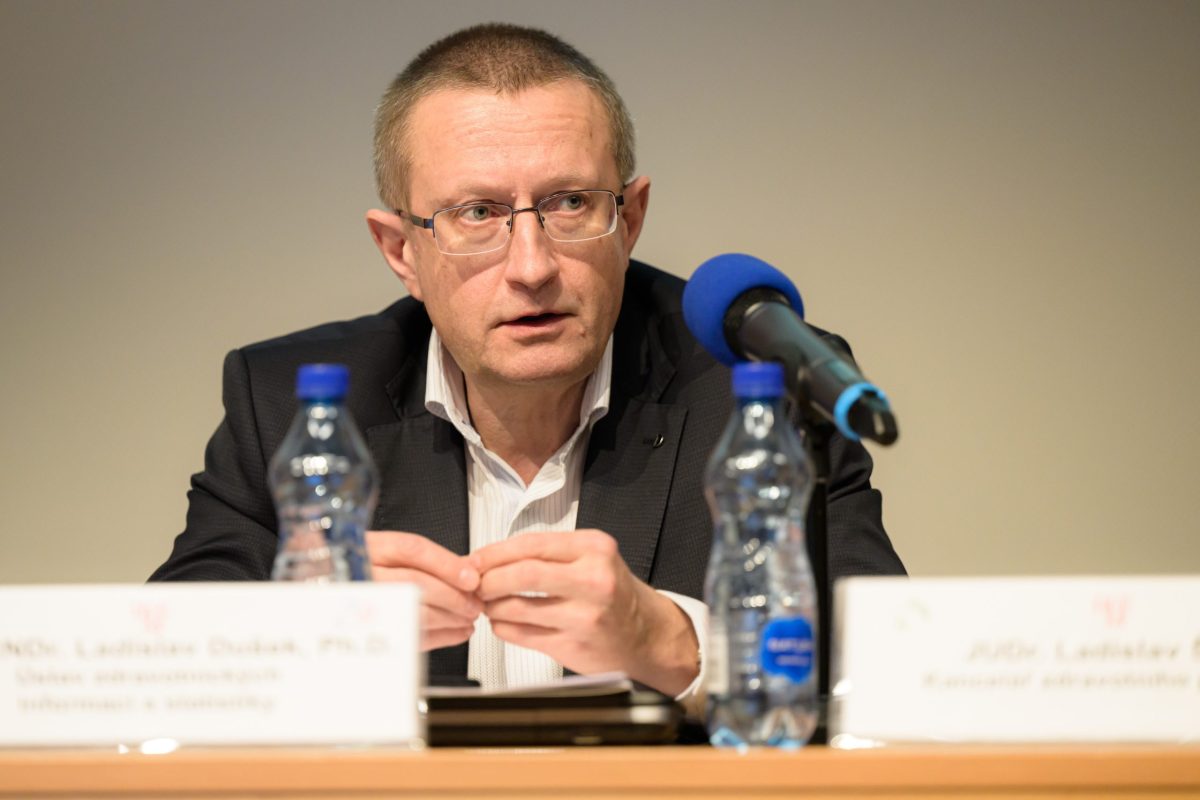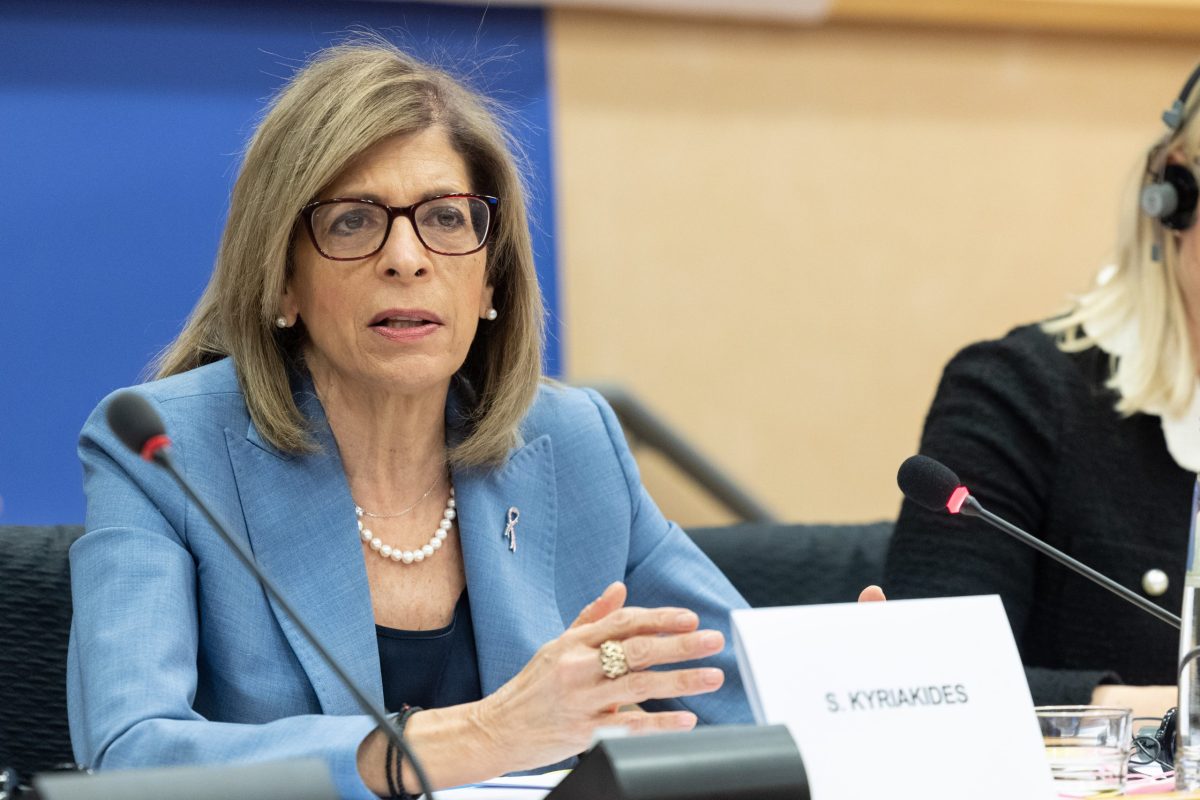Out of crisis comes the opportunity – to change, improve and build back better and stronger. This has been repeated several times by Health and Food Security Commissioner Stella Kyriakides who visited Prague in September to attend a meeting of EU health ministers. As regards the Ukraine crisis, the Czechs have been showing the very best of European solidarity, and following the COVID-19 pandemic, the European Union has taken several steps to put in place a true European Health Union, explains Commissioner Kyriakides in an interview with Zdravotnický deník, where she also further outlined her upcoming plans.
You have visited a number of countries, including Poland and Czech Republic, and in your own eyes saw the consequences of the Ukraine crisis. From your point of view as Health Commissioner, how have these countries been dealing with this unprecedented event?
Since the beginning of Russia’s war of aggression against Ukraine and its people, all of our Member States, and in particular those bordering the country or in close vicinity, such as Czechia, have all risen to the challenge.
Thanks to the tremendous spirit of solidarity at EU level, refugees and displaced persons who have lost their homes, their communities and their livelihoods have been welcomed with open arms and supported during the most challenging of circumstances.
I have visited several of the most impacted Member States in recent months, including Czechia, spoken to refugees, and heard their heart-breaking stories about destroyed lives and families torn apart.
These Member States have played a crucial role in ensuring that those fleeing Ukraine have access to medical treatment and care, including as a first port of call for support, either for routine health checks and vaccinations, mental health support or before being transferred for urgent hospital treatment if needed in another Member State.
Mohlo by vás zajímat
We will of course continue to do everything we can to support all Member States in their efforts to support people coming from Ukraine. For as long as this is needed.
The EU has been helping the countries with the largest number of refugees with the supply of the needed vaccines as well as cross-border transfer of patients. Yet, in the past, Member States like Poland and the Czech Republic asked for direct financial support for their healthcare services due to the influx of new patients, especially children. In Czechia so far, the system has absorbed the refugees well but a new wave of refugees is expected with the upcoming winter. Financing from the National Recovery Plan cannot be used as the money have been already allocated. Is there a possible way how the EU can help financially in this way, or is it out of question as it is beyond the scope of the Commission´s competences?
Czechia and Czech citizens have been doing everything they can to welcome and support Ukrainians with open arms. This is the very best of European solidarity and values.
We are doing everything we can to support Czechia and other Member States in their efforts to do this when it comes to education, healthcare and housing.
To do so, we have made €17 billion available to support Member States. EU funding can be used for schooling, for housing and for healthcare, for example. To ensure that Member States can make use of funds as soon as possible, we have made sure that sure that €3.4 billion of this bigger package of €17 billion, coming mostly from the cohesion funds, was frontloaded to give immediately liquidity to the Member States that are hosting refugees.
To further support frontline and most affected countries welcoming refugees from Ukraine, an additional €400 million was allocated from the EU budget in April to provide urgent assistance to them. So far, Czechia has received over €27 million from these funds.
As for many EU funds, they are implemented at the level of the Member States or regions. How much and how the available funding is used therefore depends on decisions of the Member States or regions.
In any case, significant funds are available for the support to health expenditure should Member States decide to make use of them for this purpose.
At the beginning of the Ukraine crisis, there were voices worrying about possible worsening of the state of health in the EU in relation with the flow of refugees. What is the situation now, have these worries been founded? If not, can anything change with the expected new wave of refugees in winter?
Our priority in the area of health has since day one been to ensure that those fleeing Ukraine have access to the healthcare they need. Many are arriving at our borders in a vulnerable state and need to be immediately taken care of. And our Member States have shown the highest levels of solidarity and resilience to support them.
Our immediate priority is to treat those in urgent need of hospital treatment and care, both emergency care or care for chronic conditions. Since early March, more than 1,500 requests for medical evacuations have been received, with around 1,300 transfers successfully completed.
The Russian war has undeniably created a difficult humanitarian situation and we are of course carefully monitoring the health situation overall and pay particular attention to vulnerabilities for infection risks and vaccination needs. Our support also includes actions on mental health and trauma support for those fleeing.
It is clear that we need to continue these efforts, especially with winter approaching, and we will continue to provide Member States with any additional support they require.
Unprecedented step towards a strong European Health Union
You took your post as Health And Food Security Commissioner just on the eve of a crisis which, actually, is still ongoing – first covid, now war in Ukraine. To what extent has it delayed your plans as outlined in your mission letter from Ursula von der Leyen? Or, on the other hand, has it helped somehow, i.e. accelerated anything?
Since the beginning of the Commission’s mandate, it is true that we have had to face a number of difficult challenges, from the COVID-19 pandemic, to supporting Ukraine and its people in the face of Russia’s brutal war, to the monkeypox outbreak. Our resolve remains strong to bring positive change, to do more together, to deliver better outcomes for our citizens – and what they ask for, more Europe in the area of health.
I am very proud of the fact that, even in the face of these crises, we have been able to deliver not only on our initial priorities, but also going further beyond out initial mandate and taking the unprecedented extra step to put in place a strong European Health Union.
We have for example begun work on several pillars of Europe’s Beating Cancer Plan since its launch in February 2020. This is a key political priority for me personally and for the Commission as a whole.
We are also progressing with our work on several important files such as the Pharmaceutical Strategy and the European Health Data Space.
As I have often said, out of crisis comes the opportunity. To change, to improve and to build back better and stronger. This is why, together with our Member States, we have put in motion significant steps to build a strong European Health Union.
We have already taken considerable steps on the preparedness side, by reinforcing the mandates of our expert Agencies, ECDC and EMA, as well as creating HERA to be our watchtower against future health threats.
In addition, our first ever ambitious and standalone EU4Health funding Programme will make €5.3 billion available until 2027 to support the process of building the healthcare systems of tomorrow, and enabling them to deliver better care for patients across the EU.
Your vision from the very beginning was “health in all policies”, which later transformed in the European Health Union. Back in 2019, health had never been much in the focus of other Commissioners. Have the two crisis changed this? And has it changed anything in the position of the Member States who have always been very strict about proportionality and subsidiarity rules and their competences as regards healthcare organisation and payment? And if yes, with the current energy crisis, is not HIAP out of focus again?
It is true that historically, public health has always been a Member State competence. Over time, the provision of healthcare has become a primary function of the state in Europe.
However, throughout the pandemic, we have seen that our citizens have looked to the EU for a strong response. However, we saw during the first months that our limited competences created a mismatch between citizens’ legitimate expectations and what we could actually provide at European level.
Since then, we have made use of all possibilities and flexibilities under the Treaties to deliver as much as possible for citizens. For example, this is how we managed to purchase and distribute COVID vaccines to EU citizens at the same time and under the same conditions.
Building on this experience, and together with Member States, we came to the conclusion that we needed to create a strong European Health Union that will not only reinforce the EU’s common preparedness to tackle emerging health threats, but also allow us to deliver on our key priorities in the area of health, such as Europe’s Beating Cancer Plan and the Pharmaceutical Strategy.
This is a project that will impact many aspects of health policy in the coming years and make a positive difference for every EU citizen.
Over the last two and a half years, we have seen that we are stronger when we work together with our Member States, and that this in turn benefits our citizens. As a result, it is clear that health policy will continue to be at the forefront of our work with the Member States and the European Parliament for the foreseeable future.
Under Proposal 10 (Equal access to health for all) of the Future of Europe Conference it is proposed to “include health and healthcare among the shared competencies between the EU and the EU Member States”. However, this “explicitly calls for the Treaty change”, as the Commission admits in its Communication of 17 June 2022. What are current Commission´s considerations on this matter – is the Commission planning to lead a discussion on this or has it decided to leave it to the initiative of the European Parliament or the Member States? What is your view as the Commissioner – is it needed and is it actually an achievable idea?
The COVID-19 pandemic and the increasing coordination that we have seen as a result of it at European level is a prime example of what is achievable when EU institutions and Member States work together in the spirit of solidarity.
As I mentioned before, our citizens expect strong EU action in the area of health. This is why, during the Conference on the Future of Europe, many of them called for Health and Healthcare to be included among the shared competencies between the EU and the Member States.
Of course, any Treaty change would need to be discussed with the Member States and the European Parliament. While it may be premature to speculate on any future Treaty change at this stage, there certainly is scope for us to do much more together, and for the EU and its Member States to cooperate more closely in the area of public health. The progress we have already made and our ongoing work to build a strong European Health Union is a clear example of this.
In her State of the Union Address on 14 September, European Commission President Ursula von der Leyen was very clear about her support for a constitutional convention to reform the EU treaties and the need to improve the way we do things and how we decide things. This would be an important step in this process, and a clear sign that we listen carefully to our citizens.
The Pharmaceutical Strategy is about patients
The COVID-19 pandemic resulted in an unusual level of global coordination and cooperation of the EU with other major regulatory authorities such as US FDA. Do you find any difference in the approach of these authorities to global cooperation and solidarity before and after the crisis?
Global solutions are required to bring an end to the global COVID-19 pandemic, since the virus knows no borders.
International cooperation has always been an important part of the role of regulators such as the European Medicines Agency. It is this collaboration and information sharing that allows essential and life-saving vaccines and treatments to be made available for citizens across the world.
However, the pandemic has made working together with our partners around the world more important than ever and brought this even more into focus. The urgency of the work of international regulators has clearly paid off, with safe and effective COVID-19 vaccines and therapeutics being developed and authorised for use in record time.
This level of cooperation could certainly be a blueprint for our work moving forward.
8) You are soon to present the pharmaceutical package, one of the flagships of your mandate. You said you want to support research and innovation in the pharmaceutical sector and, and at the same time, keep the medicines available and affordable. This is an area with a great number of conflicting interests and opinions, which may be even justified, yet all cannot be satisfied (for example in the area of IP rights). Where is the line that you decide to put aside one opinion and adopt the other?
The Pharmaceutical Strategy will shape our work in this area for the coming decades and aims to ensure that all patients can access the affordable, innovative, high-quality, safe, sustainable and effective medicines they need, when they need them, and regardless of where they live in the EU.
It will also support the competitiveness and innovative capacity of the EU’s pharmaceutical industry.
As part of this, we will be proposing a revision of the EU’s pharmaceutical rules, on one hand to promote innovation especially where it is needed most, and to make this innovation more easily available and accessible across the EU.
Of course, the success of the Strategy will depend on the commitment and contribution of all actors in the pharmaceutical sector, from patient stakeholders to industrial partners.
Ultimately, we must not lose sight of the fundamental goal of our work: the Pharmaceutical Strategy is about patients. We are putting the patient at the centre of our pharmaceutical policy, every step of the way while ensuring the EU pharmaceutical industry remains competitive and innovative.
The overarching goal here is to ensure innovation that addresses unmet medical needs, and provides affordable and sustainable medicines that reach patients across the EU.
This will translate into healthier citizens, more accessible and more resilient health systems, and stronger, more equal societies.
Helena Sedláčková







